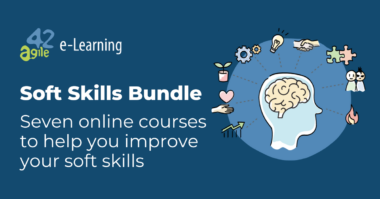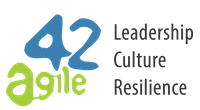28 Ways to Humanize Work
As the world becomes more interconnected, people now have job opportunities across the globe. A successful career is no longer about loyalty, climbing the ladder – or even a hefty paycheck and perks. So if money can’t buy you top-tier professionals, how exactly do companies attract and retain top talent?
These days, professionals who understand their worth are seeking something more profound; something that money alone can’t buy. They’re looking for human-centric, happy, and healthy working environments that enrich their lives, fuel their passions and nurture their growth. But it’s also about more than just ticking boxes or trends, as the rise and fall of the office beanbag chair has demonstrated. Humanizing the workplace is an art; it is a revolution, centered on empowering the humans that make our organizations tick.
At agile42, our long-lasting team, some with us for over a decade, has a simple secret: we treat team members as humans. We don’t just offer jobs; we build homes for talent to thrive. But you don’t have to take our word for it. We’ve asked each team member to share their insights on creating environments where people flourish. Here’s what they had to say.
Foster Self-Organization and Trust
Alessa Leuschen, an Agile coach at agile42, emphasizes the importance of trust and autonomy in the workplace. “Allow teams to self-organize and trust them,” she suggests. When employees are given the freedom to make decisions and manage their own work, it not only fosters a sense of ownership but also promotes a more humanized work environment.
Support Soft Skills Development
Don’t underestimate the significance of nurturing soft skills within the workplace. As Digital Marketer Lauren Edwards puts it, “Cultivating a workplace that values soft skills is not just an investment in employees; it’s an investment in the soul of the organization.” These skills encompass empathy, communication, and adaptability, fostering harmonious relationships and a thriving company culture.
-
 Soft Skills Online Courses Bundle€79.00 – €299.00 (excl. VAT)
Soft Skills Online Courses Bundle€79.00 – €299.00 (excl. VAT)
Embrace Difficult Emotions for Adaptation
Agile coach Ninja Granzow urges us, “Do not ignore difficult emotions. Discover them with curiosity and kindness to use them as indicators for adapting to change.” By embracing and exploring challenging emotions, we recognise them as valuable signals that can help us adapt to change and foster a healthier work environment.
Empower Employees with Remote Work Freedom
Turkish coach Figen Yalcinkaya suggests providing employees with the freedom to work remotely if circumstances can allow it, and eliminating the issues associated with micromanagement. She advocates for, “Ridding managers from the disease of constant observation and micromanagement.” This approach allows team members to take ownership of their work and fosters trust, contributing to a more autonomous work culture.
Maintain Work-Life Balance
German coach Dennis Büscher underlines the importance of a balanced life, stating, “Have a balance and do not forget to do what is important for you. Find a way to integrate it.” In the pursuit of a humanized workplace, he encourages us to prioritize our well-being and personal interests. Balancing work and personal life is essential for both our professional and personal growth, fostering a healthier and more fulfilling work environment.

Use These Five Daily Hacks to Happiness
South African coach Debbie Hishin provides a valuable set of daily practices for cultivating happiness and well-being, based on a TED Talk by Shawn Achor titled The Happy Secret to Better Work. The secret? Just five simple daily habits:
- Exercise
- Gratitude
- Meditation
- Journaling
- Random Acts of Kindness
By integrating these practices into our daily routines, we can enhance our overall happiness and, in turn, create a more positive and humane workplace culture.
Embrace Positivity and Trust in the Workplace
Dennis Büscher advises us to stay positive and trust in the capabilities of our colleagues. “Think positive, believe in humans and do not panic when things come unexpectedly”, he advises. “Most of the time we overthink stuff and get nervous even though everything works well 99% of the time.” This perspective reminds us that maintaining a positive outlook and trust in our team members can alleviate unnecessary stress and contribute to a more harmonious workplace.
Infuse Fun and Humor into the Workplace
German coach Birge Kahraman highlights the transformative power of injecting joy and humor into work, stating, “Have fun and bring humor to the workplace. Even if you are working in the most strict working environment, it’s up to you to make it more colorful.” You have the power to contribute to a more vibrant and humanized workplace, even in more formal, rigid, and corporate settings.
Foster Change by Shaping the Environment
Giuseppe De Simone, senior coach at agile42 Sweden, imparts a crucial lesson, stating, “Do not push change on people. You cannot change people: you can hardly change the person you see in the mirror every day. Change the environment instead, to make good things easy and bad things hard.” This insight highlights the importance of creating a conducive work environment that naturally encourages positive behavior, ultimately humanizing the workplace.
Show Authentic Interest in Your Colleagues
Debbie Hishin, a Scrum Master at agile42 South Africa, emphasizes the importance of genuine care and interest, not just in daily tasks but also in personal connections. She suggests, “Reach out individually, not just in daily standups.” She highlights the value of “random acts of human kindness and asking about people one-on-one”. This approach not only strengthens relationships but also contributes to a more humane and supportive work environment where colleagues feel valued and understood.

Show Genuine Empathy
Alessa Leuschen, coach on agile42’s German team, reminds us to connect on a personal level with our colleagues by urging, “Ask your colleagues how they are really doing. Show interest and empathy.” This simple act of genuine concern can make a significant difference in fostering a more empathetic workplace culture. It encourages open communication and helps team members feel valued and supported.
Express Gratitude and Appreciation
Debbie Hishin encourages us to acknowledge the efforts of our colleagues by saying two simple but often underused phrases, “Thank you” and “Well done!” She reminds us, “We don’t say these things often enough to people we work with every day.” Expressing gratitude and appreciation can foster a culture of recognition and support, contributing to a more humanized and positive workplace atmosphere.
Embrace Your Uniqueness at Work
“We are all unique and wonderful minds and souls,” German coach Dennis Büscher reminds us, “Do not leave this ‘at the door’ when working”. In efforts to humanize the workplace, it’s important to bring your whole self to the office. “Think about what characterizes you and what is important for you”, Büscher encourages us, “and find a way to express it also in your work environment.”
Unveil the Personal Side of Your Brand
Ernst Botes, agile42’s social media marketer, believes in revealing the human side of your brand through social media. He advises, “Don’t be afraid to show the people behind the logo. Share the stories, challenges, and victories of your team. It’s these human elements that truly resonate with your audience.” By incorporating personal narratives and showcasing the human aspects of your brand, you can create a more relatable digital identity.
Avoid Judging; Stay Curious and Open-Minded
“Every colleague has their package to carry, and you don’t know anything about it,” offers Alessa Leuschen. “Don’t judge other people, be curious and open-minded.” This wise advice reminds us to approach our colleagues with empathy and an open heart, recognizing that everyone brings their unique experiences and challenges to the workplace. Embracing curiosity and open-mindedness can lead to a more compassionate and humanized work environment.
Acknowledge and Harness Emotions at Work
“People have emotions, and you cannot get rid of emotions in the workplace”, emphasizes Giuseppe De Simone. “Instead of fighting them or pretending they do not exist, embrace them and learn how to use them in an intelligent way.” By recognizing and harnessing emotions, we can cultivate a more emotionally intelligent workplace where feelings are acknowledged and leveraged for the benefit of both individuals and the organization as a whole.
Embrace Wholeness in the Workplace
Debbie Hishin urges us to see each other as “whole people” and abandon the separation of your ‘work’ personality and ‘home’ personality. Instead, she encourages us to “integrate as one human [and] build trust through authentic human connections and kindness.” This approach fosters an organizational culture where colleagues are seen as multifaceted individuals, and it paves the way for more genuine and meaningful relationships.
Prioritize Social Contact Beyond Work
Lothar Fischmann, an agile coach at agile42, emphasizes the importance of fostering connections beyond the confines of work. He advises, “Make sure that you have some time for social exchange beyond back-to-back meetings.” This tip underscores the value of creating space for colleagues to build meaningful relationships and connections outside of formal meetings.
Choose Words Wisely: We Are People, Not Resources
Matteo Carella offers a significant reminder: “If you mean ‘people’, say ‘people’, not ‘resources’. Language shapes how we think. Talk differently, think differently.” His advice emphasizes the power of language in shaping our perspective. The language we use should respect the individuality and humanity of our colleagues.
Acknowledge Human Needs at Work
Ninja Granzow, a German Agile coach, stresses the importance of recognizing employees and colleagues as human beings with fundamental needs. She advises, “Recognize employees and colleagues as human beings with needs of autonomy, a sense of belonging, and mastery.” When we address these fundamental needs within the workplace, we help to create a work environment that nurtures individual growth and well-being.
Leverage Social Media for Connection
Ernst Botes, agile42’s social media marketer, stresses the importance of leveraging social platforms to foster genuine connections. He shares, “In the digital age, social media isn’t just about posting; it’s about connecting. Every like, share, or comment is a chance to create a real connection with your audience.” This insight highlights the power of authentic engagement on social platforms, contributing to a more humanized and meaningful online presence.
Prioritize a Safe and Non-Toxic Workplace
Figen Yalcinkaya, a Turkish coach, emphasizes the importance of “Providing a good, safe, non-toxic workplace environment,” to create a space where employees can thrive without fear or stress. A toxic culture is the number one reason people leave jobs, according to a 2022 survey by Flexjobs. For this reason, commitment to a healthy and supportive atmosphere is absolutely crucial if you hope to retain your team.
Harness the Power of Storytelling
Regina Martins, the owner of agile42 South Africa, underscores the significance of storytelling in the workplace. She states, “Every one of us has a story, and knowing the stories behind the people – who they are beyond the colleague persona – is important.” Regina’s past experience includes working for an organization that actively conducted team storytelling sessions, typically facilitated by organizational development experts. During these sessions, team members shared personal stories, contributing to a deeper understanding of one another as multifaceted individuals. This practice not only nurtures psychological safety but also helps create a more inclusive and humanized work environment where the stories that shape the individuals behind the colleagues are celebrated and respected.

Foster Openness and Vulnerability for Mutual Connection
Debbie Hishin reiterates the significance of openness and vulnerability, highlighting that it’s a two-way street. She advises, “Show openness of yourself for others to be open. Vulnerability is two ways. Exhibit it via stories, and others will follow.” This practice encourages colleagues to connect on a deeper level, sharing stories and experiences to create a more compassionate and open work environment.
Simplify the Hiring Process
In the pursuit of humanizing the workplace, Alessa Leuschen offers valuable insight: “Keep your hiring process simple.” A convoluted and overly bureaucratic hiring process can be discouraging and detract from the overall employee experience. Streamlining the process makes it more accessible and appealing to potential team members. Digital Marketer Lauren Edwards agrees, saying “There’s nothing that puts me off a company like having to spend hours on an application, only to get an automated email asking me to record a video interview powered by a robot. I want to work with humans, and the robots don’t give me any sense of what kind of company I’ve applied to!”
Embracing Empathy in Digital Marketing:
Lauren Edwards, agile42’s Digital Marketer, believes, “Empathy is the cornerstone of connection, even in the digital realm”. Even when you’re dealing largely in the virtual realm, it’s that human connection that matters most. Edwards continues, “Listen to your audience, understand their needs, and create content that resonates with their emotions and aspirations”. By infusing empathy into your digital marketing strategy, you can foster a more compassionate and relatable work environment, where employees and clients feel seen, heard, and valued.
Strive for Balance in Work Dynamics
Many companies oscillate between being overly serious, and treating their employees like children. Workplace dynamics are difficult to manage – unlike other relationships, there are often hierarchies and power dynamics to negotiate. Matteo Carella urges us to strike a balance: “Human systems tend to operate far from equilibrium: avoid extremes and continuously find a balance,” he says. “Don’t take work too seriously and don’t make it too childish.”
Invest in Employee Wellbeing and Development
Figen Yalcinkaya of agile42 Turkiye encourages the implementation of wellbeing programs for employees, as well as initiatives like art, music, travel, and other avenues of personal growth. By focusing on, “wellbeing programs for employees, physical and mental support programs, and programs that increase the quality of life,” organizations can demonstrate a commitment to their employees’ holistic development, leading to a more fulfilled and humanized workplace.
Need help making lasting organizational changes?
agile42 offers coaching, mentoring, training, and more to help your organization overcome it’s biggest challenges. Reach out to us at [email protected], or fill in the form next to this paragraph, letting us know what you’re struggling with. We can help!




